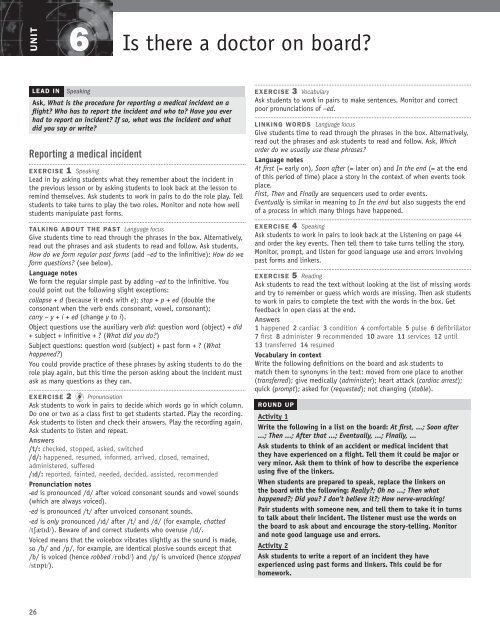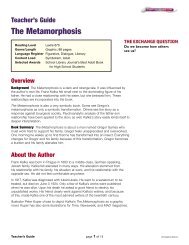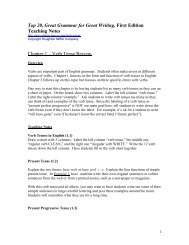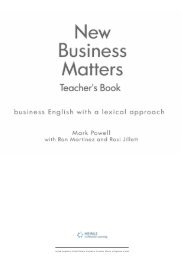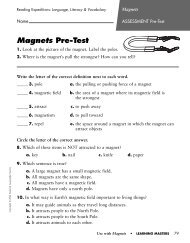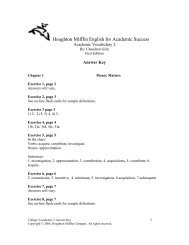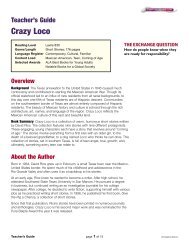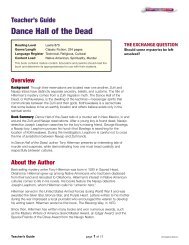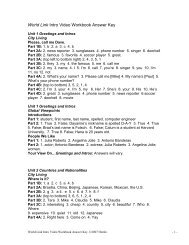English for Cabin Crew Trainer's Guide - Heinle
English for Cabin Crew Trainer's Guide - Heinle
English for Cabin Crew Trainer's Guide - Heinle
Create successful ePaper yourself
Turn your PDF publications into a flip-book with our unique Google optimized e-Paper software.
UNIT<br />
6 Is there a doctor on board?<br />
LEAD IN Speaking<br />
Ask, What is the procedure <strong>for</strong> reporting a medical incident on a<br />
fl ight? Who has to report the incident and who to? Have you ever<br />
had to report an incident? If so, what was the incident and what<br />
did you say or write?<br />
Reporting a medical incident<br />
EXERCISE 1 Speaking<br />
Lead in by asking students what they remember about the incident in<br />
the previous lesson or by asking students to look back at the lesson to<br />
remind themselves. Ask students to work in pairs to do the role play. Tell<br />
students to take turns to play the two roles. Monitor and note how well<br />
students manipulate past <strong>for</strong>ms.<br />
TALKING ABOUT THE PAST Language focus<br />
Give students time to read through the phrases in the box. Alternatively,<br />
read out the phrases and ask students to read and follow. Ask students,<br />
How do we <strong>for</strong>m regular past <strong>for</strong>ms (add –ed to the infi nitive); How do we<br />
<strong>for</strong>m questions? (see below).<br />
Language notes<br />
We <strong>for</strong>m the regular simple past by adding –ed to the infi nitive. You<br />
could point out the following slight exceptions:<br />
collapse + d (because it ends with e); stop + p + ed (double the<br />
consonant when the verb ends consonant, vowel, consonant);<br />
carry – y + i + ed (change y to i).<br />
Object questions use the auxiliary verb did: question word (object) + did<br />
+ subject + infi nitive + ? (What did you do?)<br />
Subject questions: question word (subject) + past <strong>for</strong>m + ? (What<br />
happened?)<br />
You could provide practice of these phrases by asking students to do the<br />
role play again, but this time the person asking about the incident must<br />
ask as many questions as they can.<br />
EXERCISE 2 Pronunciation<br />
Ask students to work in pairs to decide which words go in which column.<br />
Do one or two as a class fi rst to get students started. Play the recording.<br />
Ask students to listen and check their answers. Play the recording again.<br />
Ask students to listen and repeat.<br />
Answers<br />
/t/: checked, stopped, asked, switched<br />
/d/: happened, resumed, in<strong>for</strong>med, arrived, closed, remained,<br />
administered, suffered<br />
/Id/: reported, fainted, needed, decided, assisted, recommended<br />
Pronunciation notes<br />
-ed is pronounced /d/ after voiced consonant sounds and vowel sounds<br />
(which are always voiced).<br />
-ed is pronounced /t/ after unvoiced consonant sounds.<br />
-ed is only pronounced /Id/ after /t/ and /d/ (<strong>for</strong> example, chatted<br />
/tS&tId/). Beware of and correct students who overuse /Id/.<br />
Voiced means that the voicebox vibrates slightly as the sound is made,<br />
so /b/ and /p/, <strong>for</strong> example, are identical plosive sounds except that<br />
/b/ is voiced (hence robbed /rQbd/) and /p/ is unvoiced (hence stopped<br />
/stQpt/).<br />
26<br />
EXERCISE 3 Vocabulary<br />
Ask students to work in pairs to make sentences. Monitor and correct<br />
poor pronunciations of –ed.<br />
LINKING WORDS Language focus<br />
Give students time to read through the phrases in the box. Alternatively,<br />
read out the phrases and ask students to read and follow. Ask, Which<br />
order do we usually use these phrases?<br />
Language notes<br />
At fi rst (= early on), Soon after (= later on) and In the end (= at the end<br />
of this period of time) place a story in the context of when events took<br />
place.<br />
First, Then and Finally are sequencers used to order events.<br />
Eventually is similar in meaning to In the end but also suggests the end<br />
of a process in which many things have happened.<br />
EXERCISE 4 Speaking<br />
Ask students to work in pairs to look back at the Listening on page 44<br />
and order the key events. Then tell them to take turns telling the story.<br />
Monitor, prompt, and listen <strong>for</strong> good language use and errors involving<br />
past <strong>for</strong>ms and linkers.<br />
EXERCISE 5 Reading<br />
Ask students to read the text without looking at the list of missing words<br />
and try to remember or guess which words are missing. Then ask students<br />
to work in pairs to complete the text with the words in the box. Get<br />
feedback in open class at the end.<br />
Answers<br />
1 happened 2 cardiac 3 condition 4 com<strong>for</strong>table 5 pulse 6 defi brillator<br />
7 fi rst 8 administer 9 recommended 10 aware 11 services 12 until<br />
13 transferred 14 resumed<br />
Vocabulary in context<br />
Write the following defi nitions on the board and ask students to<br />
match them to synonyms in the text: moved from one place to another<br />
(transferred); give medically (administer); heart attack (cardiac arrest);<br />
quick (prompt); asked <strong>for</strong> (requested); not changing (stable).<br />
ROUND UP<br />
Activity 1<br />
Write the following in a list on the board: At fi rst, ...; Soon after<br />
...; Then ...; After that ...; Eventually, ...; Finally, ...<br />
Ask students to think of an accident or medical incident that<br />
they have experienced on a fl ight. Tell them it could be major or<br />
very minor. Ask them to think of how to describe the experience<br />
using fi ve of the linkers.<br />
When students are prepared to speak, replace the linkers on<br />
the board with the following: Really?; Oh no ...; Then what<br />
happened?; Did you? I don’t believe it?; How nerve-wracking!<br />
Pair students with someone new, and tell them to take it in turns<br />
to talk about their incident. The listener must use the words on<br />
the board to ask about and encourage the story-telling. Monitor<br />
and note good language use and errors.<br />
Activity 2<br />
Ask students to write a report of an incident they have<br />
experienced using past <strong>for</strong>ms and linkers. This could be <strong>for</strong><br />
homework.


